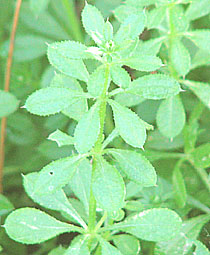
Herbs for Hoof Problems -
Using Herbal Remedies to maintain Healthy Hooves
 Some
horses are born with poor hooves - using herbs can help
to keep them in the best condition.
Some
horses are born with poor hooves - using herbs can help
to keep them in the best condition.
A horse’s hooves are also affected by the conditions the horse is kept in, the food it eats, and the farrier who shoes and trims its feet.
Hoof problems such as dry or brittle hooves, slow growth, cracked and poor quality horn can often be improved by using herbs and different types of herbal remedies.
IMPROVING CIRCULATION AND BLOOD SUPPLY TO THE HOOF
Any herb that stimulates and improves circulation and blood supply to the foot will help improve both the quality and quantity of horn in the hoof.
Herbs such as comfrey, buckwheat, hawthorn and nettle will help with circulation, blood cleansing and cell growth.
HERBS AND ESSENTIAL OILS TO IMPROVE HORN GROWTH IN THE HOOF
The condition of a horse's hooves can be helped by external applications.
Herbal remedies with herb extracts such as comfrey, or essential oils (suitably diluted) such as lavender or rosemary, when applied externally to the coronary band, can help to stimulate the circulation, thereby improving horn growth.
CLIVERS - RICH IN SILICA
 Herbs rich in silica, such
as clivers,
are excellent to improve horn and hoof quality.
Herbs rich in silica, such
as clivers,
are excellent to improve horn and hoof quality.
Feeding clivers to horses - If possible, pick and give the horse several handfuls daily during the spring and summer months when clivers is freely available.
Also look out for herbal equine supplements containing clivers
KELP FOR MULTI - VITAMINS
Kelp is an excellent form of multi vitamin and hoof supplement, containing balanced quantities of essential minerals such as iron, selenium, iodine, sulphur, copper, magnesium, zinc, as well as beta carotene, vitamins D, E, C, B1 and B2, niacin, and up to 20 different amino-acids.
ROSEHIP
Rosehip is often recommended for hooves because it contains biotin - but the amounts of biotin that rosehips contain are minute - not enough to provide a significant or beneficial dose.
However rosehips fed as a herb can improve hoof quality and growth.
They contain large quantities of vitamin C (up to 6000mg per kg) which support and maintain healthy connective tissue and cell walls in the hoof
Also the flavonoids (plant constituents with a variety of properties eg diuretic, anti- inflammatory, antispasmodic and antiseptic) that rosehips contain, which include rutin, will strengthen fragile blood vessels in the horse's circulatory system and improve blood supply.
Another benefit of feeding Rosehips is that they contain iron.
HOW TO FEED ROSEHIPS TO YOUR HORSE
How to feed rosehips: Rosehips can be given to a horse freshly chopped, as a tea or bought as a feed supplement in powder form as a herbal remedy.
MOISTURE - A NATURAL SOLUTION FOR BRITTLE HOOVES
Moisture is vital to the health of a horse or pony's hooves to prevent them from becoming dry and brittle. The hoof wall isporous and moisture is easily drawn out through the walls.
Although not a herbal remedy water is a natural wasy to help maintain healthy hooves.
How to moisturise you horse's feet: One of the most natural ways to get moisture into the hoof is by walking through wet grass! Alternatively try to soak your horse or pony's hooves in a shallow bucket of waterto increase moisture in the hoof - do this before applying hoof oil .
HORSE CARE ARTICLES AND EQUINE ADVICE
Feeding Linseed | Selenium | Equine nosebleeds | Redworm | Horsebox Repairs Somerset | Sweet Itch | Laminitis | Equine kissing spines | Horse Colic | Pelham Bits | Treating Cracked Heels | Hackamore | Worming | Livery Yards Berkshire | Horse Feed Surrey | Rain Scald | Probiotics | Horse Livery Wilts | Feeding Carrots To Horses | Sweet Iron Bit | Contracted Tendons in Foals | White Line Disease | Feed Balancers |